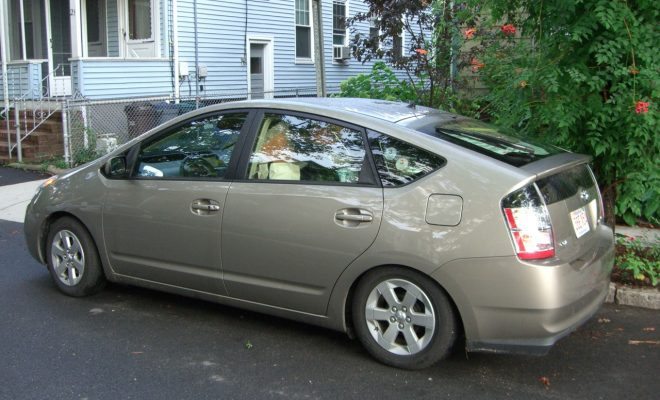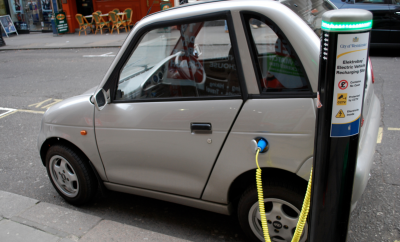 Image courtesy of [Keith Fahlgren via Flickr]
Image courtesy of [Keith Fahlgren via Flickr]
Energy & Environment
The Tax Credit Battle Over Environmentally Friendly Cars
In a world where the price of gas is costly for both our wallets and the environment, environmentally friendly cars are becoming increasingly popular. In fact, the United States government is encouraging the purchase and use of environmentally friendly cars by offering tax credits. Read on to learn about the environmental car trend, tax credits offered, and their effects.
What are environmentally friendly cars?
Environmentally friendly cars, sometimes referred to as “green” cars, are essentially cars that minimize their harmful effects on the environment. They can include, but are not limited to:
- Hybrid cars: While these cars can take many forms, this category of eco-friendly cars include any type of car that uses multiple energy sources to power a vehicle. The most common type is a hybrid-electric vehicle.
- Bio-diesel cars: These cars are powered by diesel, or a mix of diesel and vegetable oil.
- Ethanol-powered cars: This category of eco-friendly cars use ethanol created from a material such as corn, barley, or wheat.
- Electric cars: These cars run on electricity and are plugged in to gain enough charge to function.
- Hydrogen-powered cars: These vehicles use hydrogen for power, in the form of fuel cells. Many versions of hydrogen cars are still in the development processes.
Eco-friendly vehicles make up a relatively small number of the vehicles sold in the United States, but the market is growing. JD Power and Associates has estimated that by 2015 eco-friendly cars that contain some sort of hybrid component could make up as much as 10 percent of the vehicle market share.
What tax credits can you obtain for using an environmentally friendly car?
The Energy Policy Act of 2005 established a series of tax incentives, namely credits, for individuals purchasing or leasing eco-friendly vehicles such as electric cars, hybrids, and alternative-fuel vehicles. This bill was expanded upon by the Energy Independence and Security Act of 2007. Because of the added cost of their fuel-efficient technologies as well as their lack of presence in the current auto market, eco-friendly cars are significantly more expensive than similar cars with engines run on gasoline. These federal tax incentives were aimed at increasing the sales of these “green” cars to make them a larger part of the transportation vehicle market and thus reduce harmful carbon emissions in the United States into the environment.
Currently, individuals purchasing electric cars and plug-in hybrids can qualify for a tax credit of up to $7,500 dollars, which in some cases can significantly reduce the cost of these cars. These incentives are designed to gradually phase out for a given manufacturer after that company has sold more than 60,000 electric cars. Individual states also have their own incentives for purchasing “green” cars. Since their introduction into the car market, there has been debate as to whether these incentives are effective reaching their goals or whether they should even be offered in the first place.
What is the argument for creating these tax credits?
Supporters of these incentives argue that tax credits will increase sales of this type of car and help establish eco-friendly car brands such as Tesla or the Nissan Leaf as economically viable options for consumers. When the federal and state tax incentives are combined with the increased fuel economy, they often become just as cheap, if not cheaper, than standard gasoline-combustion cars. Leases are popular for these relatively-new cars, and in many states such as Washington and Georgia, where state tax incentives for eco-friendly cars are high, individuals are able to lease these cars nearly for free.
Supporters assert that these tax incentives allow fledgling hybrid manufacturers to gain an economic foothold and to become serious competitors in the auto market. Through increased sales due to federal tax incentives, Nissan was able to open lithium ion battery factories in Tennessee to cut down on cars being shipped from Japan, allowing them to drop the price of the Nissan Leaf by $6,400. Price reductions such as this will lead to increased sales and company growth, allowing hybrid manufacturers to gain a larger share of the profit from auto sales. Altogether, as hybrid manufacturers grow and as more people purchase and lease hybrid and electric cars, US emissions will be dramatically reduced.
What is the argument against creating the tax credits?
Opponents of these tax incentives argue that the tax credits do not make these environmentally-friendly cars more cost effective; they do not help reduce emissions; and they only make “green” cars more affordable to already-wealthy individuals while requiring taxpayers and the federal government to foot the bill.
The federal government imposes standards on the average fuel economy of all vehicles each company sells, and mandates that a company cannot exceed this limit. By selling more hybrid cars, car companies are in fact able to sell more low-fuel economy cars while still adhering to these federal standards, thus negating the tax incentives’ effect on improving the environment. And while tax incentives in some states may make eco-friendly cars cheaper to lease, some studies indicate that even with the tax incentives cars such as the Chevy Volt could still take up to 27 years to pay off.
The Congressional Budget Office stated in a 2012 report that it would require tax incentives of about $12,000 — $4,500 higher than current incentives — to have a serious impact upon the price of hybrid and electric cars. According to these reports, hybrid and electric cars still are not affordable to the average consumer. Opponents then argue that the tax incentives only serve to make these eco-friendly cars more affordable for affluent families who can already afford them. Meanwhile, the federal government and taxpayers are forced to cover the money lost by these incentives. The Congressional Budget Office report estimated these incentives would cost the federal government roughly $7.5 billion through 2019.
There’s also some concern about whether or not hybrids are actually good for the environment, as depicted in the infographic below.
Conclusion
Environmentally friendly cars are certainly here to stay, and while their market share increases the government has been happy to encourage it. However, as they become more prevalent among the average driver, the government may not have the resources to continue with the tax credits. For now, it’s a innovative program that could be a good choice for those in the market for a new car.
Resources
Primary
State of Utah: Clean Fuel Vehicle Tax Credit
U.S. Congress: Energy Policy Act of 2005
Additional
Wall Street Journal: To Spark Buyers for Electric Cars, Drop the Price to Nearly $0
Street: Why Electric Cars Are Selling in California: They’re Free
Palisades Hudson Financial Group: Atlanta Turns Over a New Leaf
Seattle Times: Seen a Tesla Today? Electric Cars Turn Up Fastest in Washington State
The New York Times: Payoff For Efficient Cars Takes Years
Fortune: Electric Vehicles Still Struggling to be Cost-Competitive
American Enterprise Institute: Subsidy-Powered Vehicles
Forbes: If Tesla Would Stop Selling Cars, We’d All Save Some Money
Congressional Budget Office: Effects of Federal Tax Credits for the Purchase of Electric Vehicles
Bankrate.com: Tax Breaks For Gas Savers
Green Car Reports: Will Georgia Kill Its $5,000 Tax Credit For Electric-Car Purchases
San Francisco Gate: Car Fuel Efficiency Tax Breaks
Internal Revenue Service: Going Green May Reduce Your Taxes









Comments